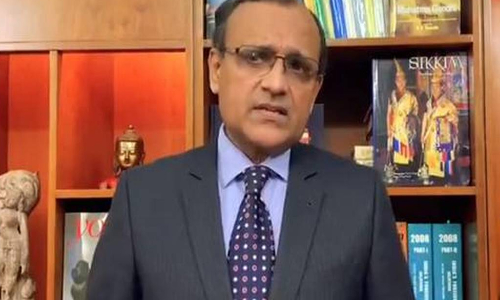UNITED NATIONS: India welcomed the progress made in the formation of transitional executive authority in oil-rich Libya and expressed hope that all parties will work constructively towards implementation of the roadmap of the Libyan Political Dialogue Forum (LPDF) and holding of elections.
India’s Permanent Representative to the UN Ambassador T S Tirumurti, who is chair of the UN Security Council’s Libya Sanctions Committee, had said that the committee is a “very important” subsidiary body of the Council, which implements the sanctions regime, including a two-way arms embargo on Libya and assets freeze, a travel ban and measures on illicit export of petroleum.
“I welcome the progress made today in formation of transitional executive authority in #Libya. I hope that all Libyan parties will work constructively towards implementation of LPDF Roadmap & holding of #elections,” Tirumurti tweeted on Friday.
Tirumurti, who assumed the committee’s chair last month, also called the 1970 Sanctions Committee, for a period ending December 31, 2021.
He had said that India was assuming the chair of this committee at a critical juncture, “when there is international focus on Libya and on the peace process.”
The 74-members of the UN-led Libyan Political Dialogue Forum selected an interim Prime Minister and President of its new executive council, marking what the UN Special Representative called another “historic moment” on the road to unification of the war-torn country and national elections in December.
Mohammad Younes Menfi was selected President of the Presidency Council and Abdul Hamid Mohammed Dbeibah was elected prime minister.
UN Secretary General Antonio Guterres welcomed the selection by members of the Libyan Political Dialogue Forum of a unified temporary executive authority. He called on all members of the dialogue and the Libyan and international stakeholders to respect the results of the vote.
The UN chief welcomed the pledges made by the new executive authority to form a government reflecting political pluralism, geographic representation, and its commitment to include no less than 30 per cent of women in executive positions, as well as to ensure the participation of youth.
“The United Nations commitment to support the Libyan people in their efforts to build a peaceful and prosperous country will continue. After the ceasefire that was agreed, the election that now took place shows that Libya is moving in the right direction,” he said.
Acting Special Representative and head of the UN Support Mission in Libya (UNSMIL) Stephanie Williams said that on behalf of the United Nations, she was “pleased to witness this historic moment.”
“The importance of the decision that you have taken here today will grow with the passage of time in the collective memory of the Libyan people,” she said.
Libya descended into crises on multiple fronts, since the fall of former ruler Muammar Gadaffi in 2011, with the country essentially divided between a UN-recognised Government of National Accord (GNA) based in the capital Tripoli, and a rival administration, led by General Hafter, who commands the western-based self-styled Libyan National Army (LNA).
Oil, the lifeline of Libya’s economy, has long been a key factor in the civil war, as rival authorities jostle for control of oil fields and state revenue. Libya has the ninth largest known oil reserves in the world and the biggest oil reserves in Africa. (agencies)


